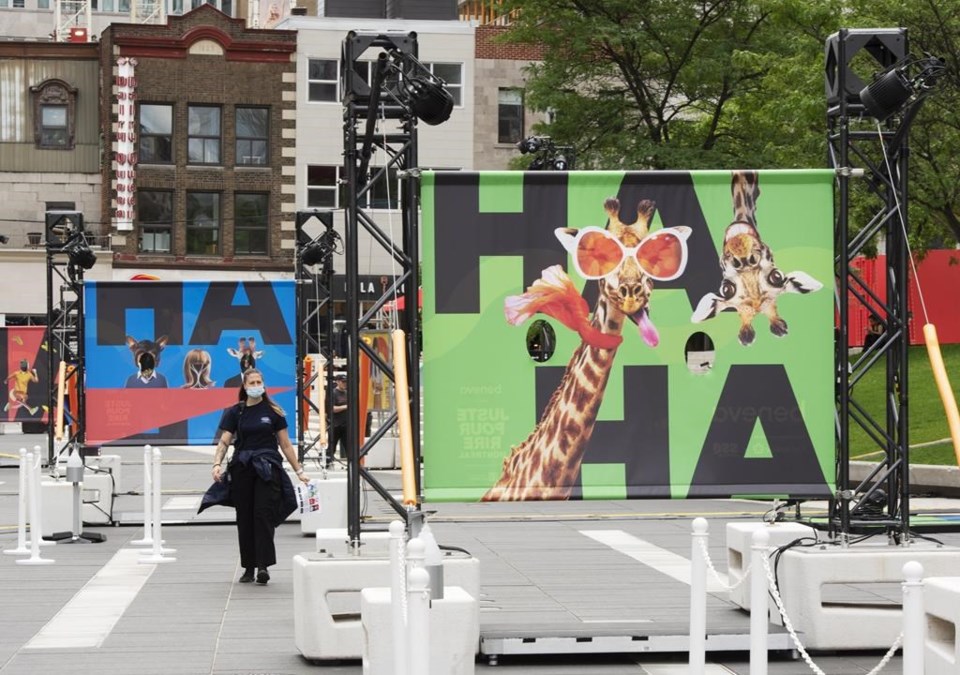MONTREAL — The cancellation of the Just for Laughs comedy festivals in Montreal and Toronto this year underscores the vulnerability of an industry struggling to manage ballooning costs while vying for increasingly in-demand but inadequate government grants.
As a result, some events are considering cuts. In Montreal, the situation is worrying organizers about whether the city can sustain its festive summer atmosphere and abundant offering of free entertainment.
"It's not easy to offer free (events), but it's important for Montreal and its reputation — that's its brand image, you might say," said Suzanne Rousseau, director of Festival International Nuits d'Afrique, a showcase of African, Caribbean and Latin American music.
"We need to think about how to keep this alive and not lose it," she pleaded. "It's urgent."
From the moment the first beat drops at the weekly Piknic Électronik shows that begin in May, a ceaseless cascade of summer events wash over Montreal, from the rip-roaring Formula 1 Grand Prix in June to the Osheaga music festival in August. Dozens of back-to-back smaller events keep the streets buzzing with activities, many of them free.
The proliferation of festivals across Canada over the years has led to greater demand for funding. And it's the free events that are particularly at risk because they rely on sponsorship revenue that has not kept pace with production and labour costs that have skyrocketed by as much as 40 per cent since the COVID-19 pandemic, says Martin Roy, president of the Regroupement des Ă©vĂ©nements majeurs internationaux, an association of major event organizers in Quebec.Â
Meanwhile, the two major sources of federal financial aid for festivals have largely stagnated, he said in a phone interview. While Quebec boosted funding for its festival aid program in 2022 — to $85 million over three years — the base budgets for the federal programs have sat at a combined $50.2 million for more than 15 years, Roy explained. Canada began injecting an additional $15 million per year into the programs in 2019, but those supplements are set to expire in the next two years.
The number of events that qualify for the federal programs has only increased, Roy said, meaning many long-time funding recipients have seen their allocations dwindle over time.
Roy said he once celebrated the growing number of festivals in Canada as a sign of industry and cultural strength, but he now admits that abundance is compounding the problem. "At some point, if the resources are not going up the number of festivals at some point has to stop going up," he said.
Rousseau and Alain Mongeau, director of Montreal-based electronic music and digital art festival MUTEK, both say they'd like to see funding programs prioritize events with significant cultural value.
In an interview, Mongeau described post-pandemic inflation as a "mini-shock" to the Montreal festival industry. "We're going to have to make some radical choices," he said. "We're going to have to say, well, maybe we'll significantly cut our programming. I think all the festivals are doing that."
Such cuts could make Canadian festivals less attractive to tourists, Roy warned, and thus have a more widespread impact on the economy. For example, Eric Hamel, CEO of the Greater Montreal hotel association, in part credits the area's festivals and events with a surge in the local hotel occupation rate during the summer months.
But if these events aren't happening, Hamel says, businesspeople might stop extending their visits and tourists would have fewer reasons to stay in the city. Businesspeople will come for conferences, "they'll do what they have to do, and then they'll go right back home," he said Wednesday.
Roy argues the economic ripple effect makes festivals a solid return on investment for governments: "I think it's a good deal."
The Just For Laughs festival brought tens of millions of dollars into Montreal every year, Andy Nulman, the event's former CEO, said in a recent interview. He said he suspects management struggles are behind the dire financial situation that led Just for Laughs to cancel its 2024 editions and seek protection from creditors. The company, however, said it hopes to run the festivals again in 2025.
But Nulman said the situation with the city's comedy festival should serve as a warning for the entire event industry.
"This is a warning bell … saying, 'Hey guys, get your act together because don't think that you are invulnerable and that this won't touch you,'" said Nulman, who also serves on the board of Montreal's tourism office. "This can touch you in worse ways than it has touched this festival."Â
In a statement, the office of Canadian Heritage Minister Pascale St-Onge pointed to the hundreds of millions of dollars the federal government has dedicated to emergency aid programs for festivals and major events since 2019, as well as additional investments in tourism projects.
"We will monitor the situation closely," her office said of festival industry troubles.
This report by The Canadian Press was first published March 8, 2024.
Thomas MacDonald, The Canadian Press



